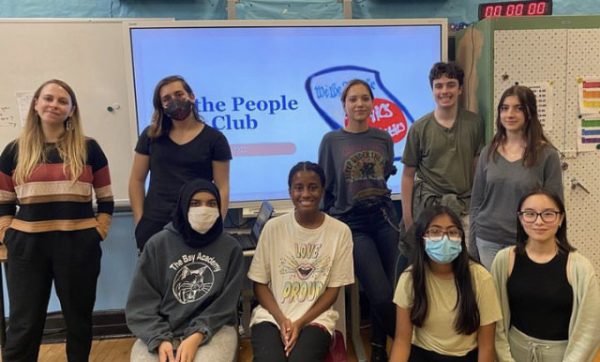Cell Phone Obsession
October 15, 2014
The week of September 19, 2014, Apple released the new iPhone 6 and iPhone 6 Plus to international markets all around the world. Being that New York harbors several Apple stores, major news outlets covered the new addition to the iPhone family. It seems when a new phone comes out, whether it be iPhone, Android or Samsung, (particularly iPhone) there is a line for days. Teens and adults throw away their responsibilities, pack their sleeping bags and canned food to camp out in front of the Apple store in the attempt to be the first of many to get their hands on the new device. As a teenager, it has been made evident that having a cell phone is essential. It’s a way of life, a dependence that keeps everyone in the loop and up to date on current events.
Despite the many advantages of the cell phone, has their usage taken over the lives of people? Has the art of conversation reached an all-time low?
To answer these pressing questions, we refer to the students of Millennium Brooklyn High School. Millennium Brooklyn High School was established in one of Brooklyn’s most expensive neighborhoods, Park Slope. This educational institution recently added the fourth graduating class, bringing the school population to 600 teenage boys and girls.
Every morning at 7:30, the students of MBHS shuffle into school with the same modus operandi: saying good morning to friends and instantly transferring their attention to the “pressing matter” on their phones. The way in which a cell phone can take up a person’s attention, one could be telling the most interesting event of the weekend and still be scrolling through text messages.
According to Meesa Wright, a senior at Millennium Brooklyn High School, having a cell phone prevents catastrophes from happening and enables students to connect with their peers and parents.
Meesa has an iPad Mini and recently lost her iPhone 4, leaving her without the device she considers to be very important. During the days the iPhone 6 and 6 Plus came out, Meesa mounted a campaign to get the new iPhone. She made a poster board outlining statistics of children who go missing if they do not have a phone, even going as far as giving her mom the “do you want me to go missing” speech. In the end, Meesa’s mother conceded to her daughter’s wishes and said that she would get Meesa an Obama Phone, a less advanced smartphone similar to the Nokia phones of the 1990s issued for free by the government, Meesa was appalled by the very idea of an Obama Phone and further pressed her case.
Julia Gorelik, another senior, went on to say that her phone isn’t her life, but various aspects of her life revolve around her phone such as her job, friends and family. Julia is also due for an impending upgrade to the iPhone 6, which she ordered via the Apple website.
Currently in Millennium Brooklyn High School, several students ranging from freshmen to seniors currently own a smartphone. The MBHS cell phone policy of the planner states “cell phones and electronic devices must be turned off while in school. They will be taken away by teachers during class and returned at the end of the day.” During gym class, a fellow classmate who will not be named broke into tears when the gym teacher took away their phone. The cellular device was in their hand but was allegedly not being used. Their phone was returned, but the very idea of the phone being separated from her caused some sort of distress.
Students think they are slick and can dodge their teachers’ wandering eyes, often propping the legs of their chair and hiding their cellular device in their laps or hiding the phone under their binders. Little do they know that the teachers know the game students play and want a challenge. In the words of one Millennium Brooklyn teacher, “Don’t make it so obvious that your phone is out.” Nevertheless cell phones are still a primary source teenagers refer to in school even though the likelihood of getting caught is so high.
Cell phones over the years have changed the way in which we can interact with the world and with each other. We are not only able to engage in “conversation” via text with our friends, but watch TV, play games, and instantly find the nearest restaurant. With all its positive features, as a people we lose our ability to go on an adventure and explore our environment by using our five senses. Yes, these smartphones are advanced. However, in order for us to not depend on technology, we must find a balance in using our cell phones in our day-to-day lives.


















